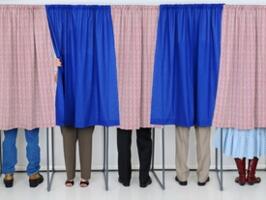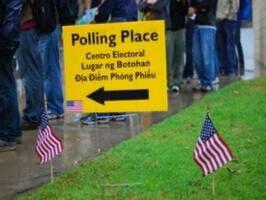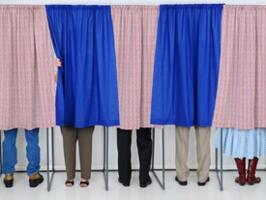Voters Don’t Play Favorites When It Comes to Immigration
As far as legal immigration is concerned, voters are more about fair play than about what might be better for the country.

As far as legal immigration is concerned, voters are more about fair play than about what might be better for the country.

Longtime Senator Lindsey Graham has entered the sea of candidates seeking the Republican presidential nomination, but GOP voters rate the South Carolinian the longest of the long-shots in the race so far.

Most voters still aren't ready to pay much, if anything, to fight global warming, but a slightly higher number are willing to spend more for the cause.

Most voters continue to welcome those who immigrate to this country legally, and they’re even more welcoming if illegal immigration is stopped.

Some attitudes don’t change: Voters continue to overwhelmingly believe that Americans need to prove their identity before casting a vote.

Americans have a love/hate relationship with the National Security Agency, but the love side of the equation’s been growing as they worry more about the threat of Islamic terrorism.

Former New York Governor George Pataki and Rick Santorum, the one-time Pennsylvania senator who came up short in the 2012 presidential contest, have joined the crowded Republican race for 2016, but GOP voters think they have little chance of capturing their party's presidential nomination.

Former Maryland Governor Martin O’Malley is an even bigger unknown to members of his own party than Vermont Senator Bernie Sanders, but both men have a steep hill to climb if they’re going to take next year’s Democratic presidential nomination away from Hillary Clinton.

Voters remain overwhelmingly positive about immigrants who work hard to support their families but also still wonder whether that is usually the case these days.

An overwhelming majority of U.S. voters think voters in democratic countries have a responsibility to stay informed, but most say that’s not the reality in America.

Are voters ready to let illegal immigrants vote? A sizable number, including most Democrats, are.

While U.S. voters believe they have it better than citizens of other countries, they still don’t think they have enough influence over who gets elected in government.
Sixty-two percent (62%) of Likely U.S. Voters think voters in this country do not have enough say when it comes to choosing their leaders, according to a new Rasmussen Reports national telephone survey. Just five percent (5%) believe they have too much say, while 27% feel the level of choice is about right. (To see survey question wording, click here.)

A federal judge today will hear arguments in a lawsuit that argues the Obama administration violated the Constitution when it changed portions of the new national health care law without Congress’ approval. It’s the first ever lawsuit by the full House of Representatives against a sitting president.

The debate over the Patriot Act and the National Security Agency’s snooping on millions of Americans is all about the balance between national security and individual rights. Similarly, increasing complaints about urban policing have us discussing the conflict between those rights and public safety.

President Obama’s plan to protect up to five million illegal immigrants from deportation has run into more legal trouble. A federal appeals court on Tuesday refused to lift a hold on the president’s executive action, and the next stop is likely to be the U.S. Supreme Court.
Rasmussen Reports surveying finds that more than half of voters remain opposed to Obama’s plan to allow the illegal immigrants to remain in this country and apply for jobs. Opposition has risen since the president announced his action last November.

The state budget picture still hasn't improved for most voters, even though they're much more likely to be paying higher rather than lower taxes these days.

Voters in states run mostly by Democrats are more likely than those in GOP-run states to feel their state government is too big, but all give similar performance reviews to those governments.

Voters still tend to think the new national health care law isn't working and expect things to get even worse.

Voters are more convinced that the radical Islamic State group (ISIS) is winning the war in Iraq but are less enthusiastic than ever about sending U.S. troops back into action to do something about it.

Voters aren’t happy with the way President Obama is fighting the radical Islamic State group and increasingly suspect that ISIS is winning the war in Iraq.